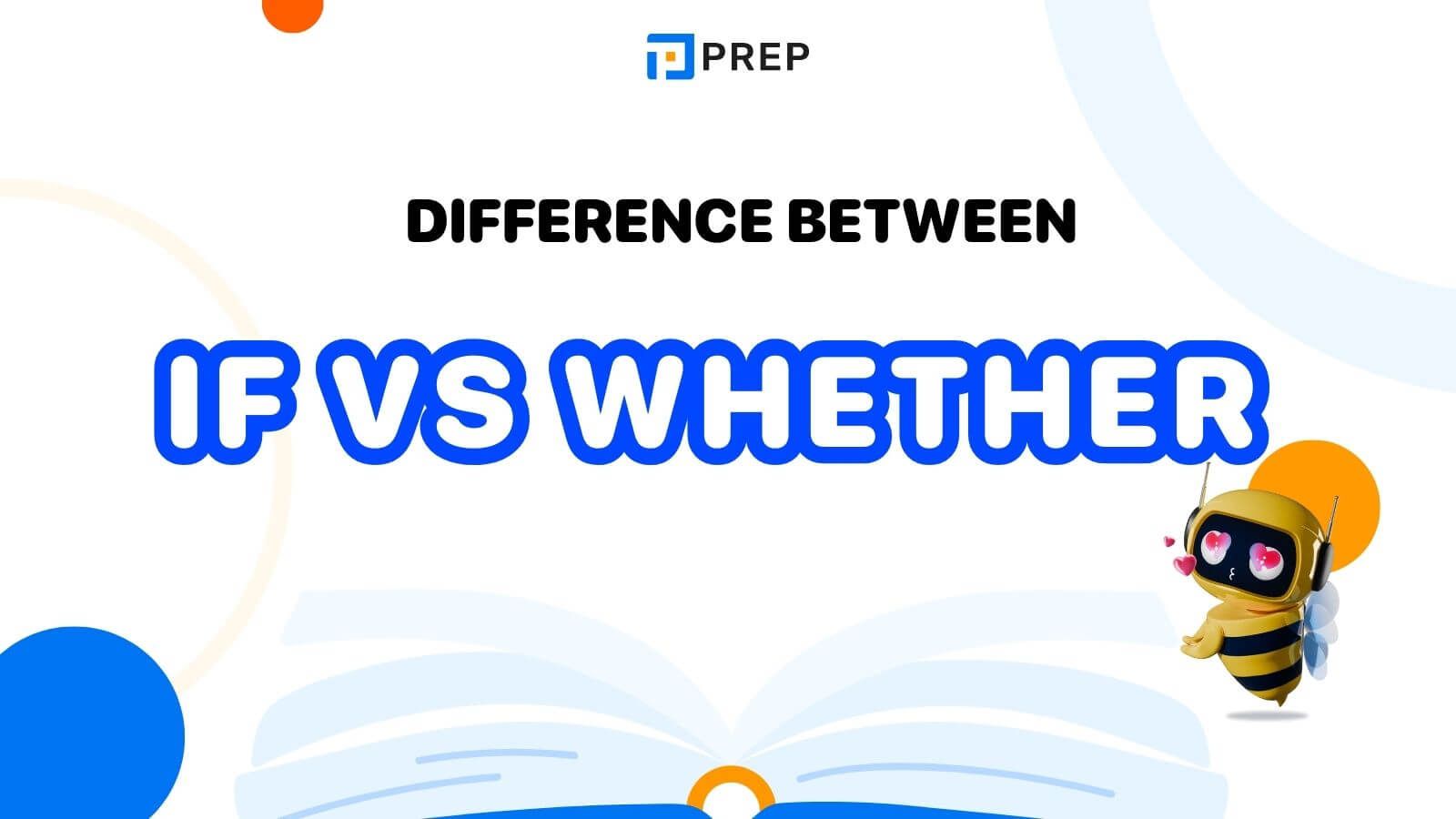Search blog
What are If and Whether? English knowledge about the If and Whether structures
Have you ever wondered about whether something is true or false? In English, the structures commonly used to express this are If and Whether. In today's article, let's explore in detail the knowledge about the If and Whether structures, including formulas, examples, and exercises with answers!

I. What is If?
If (pronounced /ɪf/) functions as both a conjunction and a noun:
-
As a conjunction, If means: "if," "in case of," or "although." For example:
-
I'll pay you double if you get the work finished by Friday.
-
They're great kids, even if they can be demanding.
-
-
As a noun, If means: something that is uncertain or undecided. For example: There's a big if hanging over the project.
Common idioms with If:
|
Common idioms with If |
Meaning |
Example |
|
If and when |
Used to emphasize uncertainty about a future event, indicating that it may or may not happen |
If and when you decide to come visit, let me know so I can prepare a room for you. |
|
If anything |
Used to suggest that the opposite of what has been previously stated may be true or more relevant |
He's not lazy; if anything, he works too hard. |
|
If I were you |
Used to give advice or suggestions, indicating what the speaker would do in the listener's situation |
If I were you, I would start studying for the exam now instead of waiting until the last minute. |
|
If need be |
Used to imply that something will be done if necessary |
We can postpone the meeting if need be, but I would prefer to keep it as scheduled. |
|
If you will |
Used to indicate that the speaker is giving permission or acknowledging someone else's wish or preference |
He’s the Mozart of our generation, if you will. |
|
If all else fails |
Used to express that a specific action will be taken only when other options have been exhausted |
If all else fails, we can always move to another city and start over. |
|
If only |
Used to express a wish that a situation were different or to express regret about something that cannot be changed |
If only I had known about the traffic, I would have left earlier. |
|
If the worst comes to the worst |
Used to indicate what someone will do if the most unfavorable situation occurs |
If the worst comes to the worst, we can always sell the house and move into a smaller apartment. |
II. What is Whether?
Whether (pronounced /ˈwɛð.ər/) functions as a conjunction, used to express a doubt or choice between two possibilities.
-
She asked me whether I was interested in working for her.
-
Whether or not Daisy resigned from her job is none of my business.
III. How to Use the Structures If and Whether
Although we often see the word "If" used in conditional sentences, the structures If and Whether that we are exploring are also commonly used in reported speech. PREP will guide you through the use of If and Whether in indirect questions and the structure "Whether or not."
1. Indirect Questions with If and Whether
The expressions "If" and "Whether" can be utilized to turn direct inquiries into reported format, used to express a doubt or choice between two possibilities. Here’s the structure for this usage:
S + V + whether/if + S + V
For example:
-
John asked if his mother could pick him up after school.
-
Jenny and I wanted to know whether our class were going to eat out.
2. If and Whether with or not
The structures If and Whether can also mean “whether something is true or not” or “whether something is the case or not.” The formulas are:
S + V + whether/if + S + V + or not
S + V + whether or not + S + V
For example:
-
I called Harry to ask whether he got married or not.
-
Our team has to process the meeting whether or not the boss is here.
Note on Using the Structures Whether or and Whether or not:
-
"Whether or" is used to present two choices or alternatives regarding an event/action. Example: I don’t know whether Harry is laughing or crying.
-
"Whether or not" is used to express negation or conflicting information. Example: Whether or not Peter likes it, he will have to learn this subject.
IV. Distinguishing Between If and Whether
At first glance, you might think that "If" and "Whether" are the same, but they have some differences in usage. Let's take a look:
|
Distinguishing Between If and Whether |
|
|
Similarities |
Both "If" and "Whether" are used to introduce Yes/No questions in indirect speech. For example:
|
|
Differences |
|
VI. Common Mistakes When Using If and Whether
In daily English communication, many people often encounter the following mistakes in the use of "If" and "Whether." Read through these common errors and remember them to avoid making similar mistakes:
|
Common Mistakes When Using If and Whether |
Example |
|
Using If before the Infinitive |
|
|
In Indirect Questions, Use Either: |
|
|
Cannot Omit If and Whether in Indirect Questions: |
|
|
Use If Directly Before Or Not: |
|
VII. Exercises on the Structures If and Whether with Answers
After learning various theories about "If" and "Whether," let's practice with some exercises to reinforce our knowledge!
1. Exercises
Exercise 1: Fill in the blanks with the appropriate "If" or "Whether."
-
I don’t know ___Jenny is coming or not, she doesn’t mention the party.
-
Kathy considered___ to continue studying her major or take up a Marketing course.
-
Tell me___ John can come to the party or not.
-
Anna’s mother is still wondering ___she will choose the red car or the blue car.
-
Kathy called John to ask ____ he finished the report or not.
Exercise 2: Rewrite the sentences using the structures If and Whether.
-
“Do you want to eat this candy?”
➡ Sara asked John _______________________________________.
-
“Have you visited Korea?”
➡ Anna asked Peter _______________________________________.
-
“Does Jenny like coffee?”
➡ Harry wanted to know _______________________________________.
-
“Is Peter playing football?”
➡ Kathy wondered _______________________________________.
-
“Are you learning Japanese?”
➡ Daisy asked me _______________________________________.
2. Answer keys
|
Bài tập 1 |
Bài tập 2 |
|
|
This concludes the detailed knowledge about "If" and "Whether," including their structures, usages, distinctions, and practical exercises. Be sure to follow PREP for more valuable English learning resources! If you have any more questions or need further practice, feel free to ask!

Comment
Related posts
Search blog
Personalized roadmap
Most read
Register for a learning roadmap consultation
Please leave your information, and Prep will contact you for consultation right away!






![[PDF+Audio] Download the IELTS Essential Guide for free!](https://cms-static-assets.prepcdn.com/uploads/ielts_essential_guide_book_3b748897cb.png?w=640&q=80)








